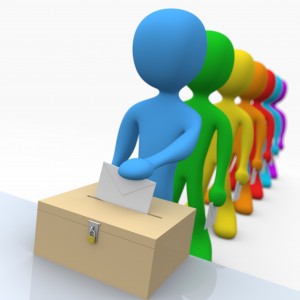Oh yes, I’m the great suppressor. Who am I? I am the polling place.
There is certainly a lot of talk these days about attempts to suppress the vote. Draconian photo ID laws, measures akin to poll taxes, restrictions to early voting and registration mechanisms. All these things have one thing in common: to deter certain voter demographic groups from voting in large representative numbers.
Most of these examples of vote suppression occur at the time of voting: It is when people show up to vote at the polling place that they are told their ID is unacceptable or that they can’t vote early or can’t register. The suppression happens at the polling place.
Those who enact these measures-state governors and legislatures-might rightly be referred to as “Suppressors”, who facilitate the disenfranchisement of voter rights at the polling place.
But by far the largest suppressor of the vote-The “Great Suppressor”- is the polling place itself.
When you think about it, shouldn’t the voter registration process be the mechanism that “weeds out” those who are eligible to vote from those who are not? Think about all of the information you must provide when registering to vote. Most registration forms include the need for the registrant’s name, address, phone number, personal information, etc. When a voter registers to vote he or she supplies all of this information and, if they are eligible, they are mailed a voter card which offers all the proof one should need to prove they are eligible to vote. The “are you eligible?” process should end there.
One of the most important things to remember about the registration process is that it is usually done well in advance of election day. Therefor if there are any issues that arise between the voter and election officials regarding eligibility, they can be corrected in time to allow the person to vote on election day. The registration process does not suppress the vote, it facilitates it.
When a person arrives at the polling place to vote, and is told for some reason that he or she is “ineligable” to vote, despite having registered, there is little the voter can do at that moment to correct the situation, whether the poll worker is correct or not in stating that the voter is ineligible. The voter is then at the mercy of the poll worker. If the poll worker decides, for any reason, that the voter is ineligible to vote normally, the next thing the worker usually does is hand the voter a “provisional” ballot and tells the voter to vote using that method. What the poll worker, who has just chosen to deny the voter the ability to vote, usually does not tell the voter at that point is that the provisional ballot rarely counts toward an election result. Voting on a provisional ballot is usually akin to not voting at all. The voter is unaware of this, and casts the provisional ballot believing it will be counted.
This kind of thing, denying a registered voter his or her right to vote and throwing a worthless provisional ballot at him, happens all the time in our elections. It is absolutely a form of voter suppression.
The polling place has also historically suppressed the vote simply due to the fact that the voter has no anonymity or privacy when he or she shows up to vote. The vote itself might be considered private, but the fact that an individual has showed up to vote is not. If for any reason partisan poll workers or watchers want to punish an individual for daring to vote at all, they know who the person is to target.
This type of activity, intimidation of registered voters at the polling place, has taken place throughout our history. In the Jim Crow South an African American voter would literally risk their life when showing up at the polling place to vote. If you dared to vote your identity was noted. Intimidation and even violence would follow.
As with most of my posts, you know where I’m going with this.
Online voting is continously vilified by its detractors as, among other things, threatening to the voters’ privacy. Just as with the other buzz-word charges of “unsecure”, “unauditable”, and “unrecountable”, I find the notion that online voting is less private than polling-place voting to be laughable.
Imagine receiving your registration card and being able to immediately go online and confirm your eligibility to vote. Nothing can then suppress you from excercising your right. You then cast your vote in as private a setting as you desire. There is nobody to watch you show up at the polling place. You do not wait hours on line. Nobody tells you that you can’t vote or hands you a worthless provisional ballot.
Most importantly, the polling place is the great suppressor simply by being the only option people have to excercise their right to vote at a time when EVERYTHING else people do is done online. Denying voters contemporary technology with which to vote is the greatest form of suppression of all.
How do we end the suppression?
Cyber the Vote!

